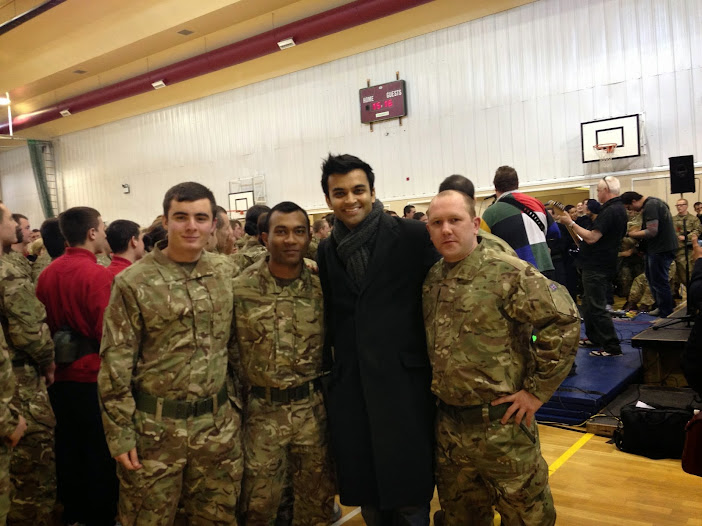On this auspicious and historic occasion, Acharya Dhruv Chhatralia gives a 3.5 hour non-stop talk on the Bhagavad Gita to seven different regiments of the British Army without taking a single break.
He spoke on the key concepts of the Bhagavad Gita including the immortality of the soul and the mortality of the body, the concept of Svadharma and our duty, the importance of Lokasamgrahan (the maintenance of the world), practical methods to attain self-mastery and to control the mind, how we can discriminate between right and wrong, meditation, battle strategies from the Mahabharata and why we worship different forms of God and cows. During the discourse, Acharya Dhruv Chhatralia also answered the questions of the soldiers and was able to change the topic of his talk based on any one question by a soldier.
He said it was not a religious scripture but a book of psychology where ShreeKrushna removes Arjuna’s delusion and makes him stand ready to perform his duty.
He said that the soldiers should meditate upon the fact that their essence was Atman, not matter, that we are not our physical bodies, and therefore we do not need to worry about death because we know that we will continue to exist and we know where we are going to go.
He said that the soldiers should meditate upon the fact that their essence was Atman, not matter, that we are not our physical bodies, and therefore we do not need to worry about death because we know that we will continue to exist and we know where we are going to go.
The soldiers took a lot of interest in the leadership qualities we can learn from Lord Ganesh including: intelligence (elephant’s head); foresight (small eyes); discrimination of the right and wrong (ears shaped like a winnowing basket); stability and database (large stomach); the ability to do both small and large tasks (the elephant’s trunk); accepting the limited intellect (half-tusk); and 100% faith (full tusk).
 Acharya Dhruv Chhatralia also explained the ten fundamental principles that define a Hindu: belief in the varna system; belief in the ashram system; we worship cows are our mother; we worship the Vedas as our mother; we do not undermine any form of God; we give equal respect to all ways of thinking and ways of life; we believe in rebirth; we believe that we can be liberated from the cycle of birth and death; our heart melts at the thought of violence; and we wish well for all living-beings (even animals and plants).
Acharya Dhruv Chhatralia also explained the ten fundamental principles that define a Hindu: belief in the varna system; belief in the ashram system; we worship cows are our mother; we worship the Vedas as our mother; we do not undermine any form of God; we give equal respect to all ways of thinking and ways of life; we believe in rebirth; we believe that we can be liberated from the cycle of birth and death; our heart melts at the thought of violence; and we wish well for all living-beings (even animals and plants).
This was an incredibly inspirational day that generated a lot of interest from the British Army on Sanatana Dharma and was a day that we will forever cherish in our hearts. Thank you to all of our team and sevaks who worked hard to organise this talk for their love, passion and dedication.
The Bhagavad Gita is not just a scripture that is worshipped or to be placed in a holy place. It is a book of life, it is the science of life and it is a book of psychology. There is not a single problem in life of which the solution is not given in the Bhagavad Gita. We are currently going on a journey through our Tuesday talks of finding the Truths of life through the Bhagavad Gita and through the preaching of ShreeKrushna.
The Bhagavad Gita preaches to us the key, the science, the process, and a Divine Journey towards our own happiness, towards our own success in life and towards our own fulfilment in life. We welcome you all my dear friends to join in our Divine Endeavour. Each week on Tuesday we will continue to share thoughts of the Bhagavad Gita, we will think about the verses of the Bhagavad Gita and of course you are more than welcome to ask questions. The more that you ask then the more that ShreeKrushna will resonate with our soul. Our very best wishes to you all.
yatra yogeshvarah krishno
yatra pārtho dhanurdharah
tatra shrīr vijayo bhutir
dhruvaa nitir matir mama
yatra pārtho dhanurdharah
tatra shrīr vijayo bhutir
dhruvaa nitir matir mama
Wherever there is Krshna, the lord of yoga,
and Partha (Arjuna), the archer,
I think, there will surely be fortune,
victory, welfare and morality.
May God bless you all!
and Partha (Arjuna), the archer,
I think, there will surely be fortune,
victory, welfare and morality.
May God bless you all!
To view the photos of the event click here:
To find out more about these talks, go to the website www.gitaclass.org
To find out more about these talks, go to the website www.gitaclass.org
Comments
Post a Comment
Please leave a comment, as it helps us to improve our articles...!